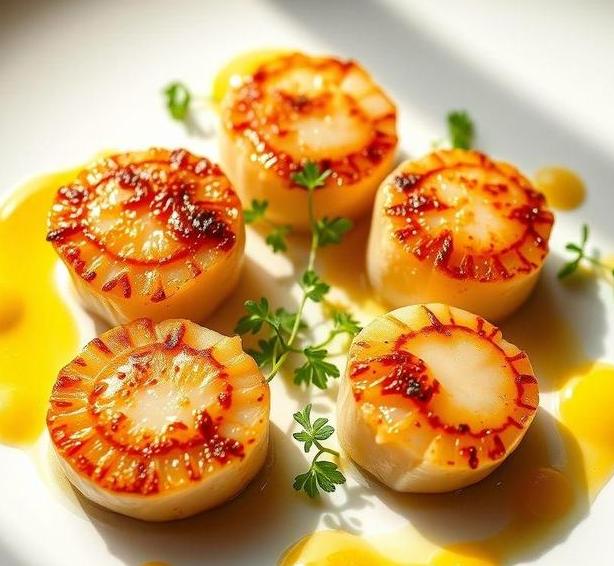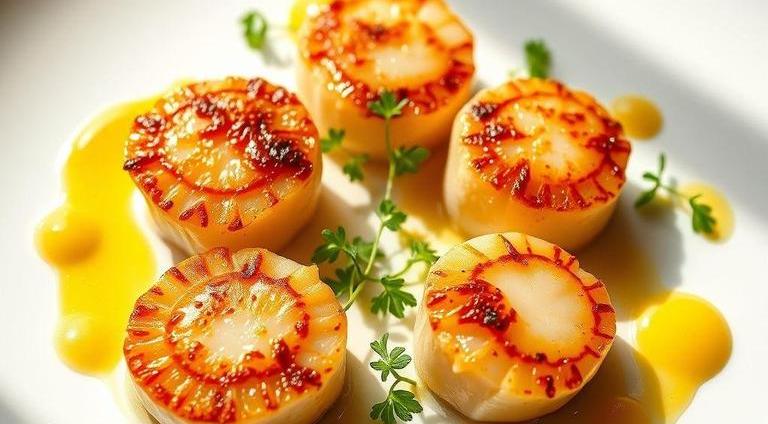Scallops, those delicate, sweet seafood morsels, are beloved for their tender texture and subtle flavor. They’re often regarded as a luxury item, gracing fine dining menus or weekend dinners at home. But like any fresh seafood, scallops are highly perishable. Knowing how to handle and store them properly is essential for maintaining their freshness, taste, and safety.
If you’ve ever found yourself wondering, “Can scallops go bad”? you’re not alone. It’s a common question for anyone who’s tried to enjoy these delicious shellfish. Properly storing them and being able to recognize when they’ve spoiled are crucial steps in avoiding the disappointment (and potential health risks) of eating spoiled scallops. Let’s dive into everything you need to know about the shelf life of scallops, how to store them, and how to tell when they’ve gone bad.
Can Scallops Go Bad?
Yes, scallops can go bad. They are fresh, highly perishable shellfish, and their shelf life depends largely on how they are stored and handled. Unlike canned or dried foods, seafood like scallops is not designed to stay fresh for long, even under the best of circumstances. Scallops that have gone bad can develop unpleasant odors, a slimy texture, or discoloration, and consuming them can lead to foodborne illnesses.
But don’t worry; this isn’t the end of your scallop enjoyment. With proper care and attention, you can keep them fresh for as long as possible. Let’s explore the factors that contribute to their spoilage and how you can ensure they stay at their best for longer.
Shelf Life For Scallops

The shelf life of scallops depends on several factors, including whether they’re fresh, frozen, or processed in some way. Let’s break it down:
- Fresh Scallops (Raw): Fresh, raw scallops have a very short shelf life. They should be eaten within 1 to 2 days of purchase if stored properly in the fridge. This applies to both “dry” (not treated with preservatives) and “wet” (soaked in phosphates or other solutions) scallops.
- Frozen Scallops: Freezing can extend the shelf life of scallops significantly. When properly frozen, scallops can last for 6 months to 1 year in the freezer without a significant loss in quality. The key is to make sure they’re tightly sealed to prevent freezer burn.
- Cooked Scallops: Cooked scallops are still perishable and should be consumed within 3 to 4 days if stored in the fridge. They can also be frozen, but their texture might suffer after thawing.
- Scallop Shells: If you’ve bought scallops still in the shell, their shelf life is similar to fresh, raw scallops, but they should be cooked as soon as possible for the best taste and texture. They should never be stored for more than a couple of days.
Tips To Keep In Mind
- When buying scallops, try to purchase them as close to the time you’ll be preparing them as possible.
- Always check the “use by” date if buying pre-packaged or frozen scallops.
Common Signs Of Spoilage
Knowing when scallops have gone bad is crucial for your safety. Eating spoiled seafood can lead to food poisoning, which is no fun. Here are some common signs to look for:
- Off-Putting Smell: Fresh scallops should have a clean, slightly briny scent, similar to the ocean. If they smell sour, ammonia-like, or foul in any way, it’s a strong indicator that they’ve spoiled.
- Color Changes: Scallops are naturally off-white, creamy, or pinkish, but if they turn gray, brown, or develop an overall dull appearance, they’ve probably gone bad.
- Slimy Texture: Scallops should feel firm and slightly moist to the touch, but not slimy. If the scallops feel slippery or have a gooey texture, they are no longer fresh.
- Dryness or Stickiness: Scallops that have dried out or developed a sticky residue may be too old or have been improperly stored.
- Mold Growth: While rare, if scallops show any signs of mold, they should be discarded immediately.
How To Check For Spoilage
- Smell them first: If the smell is unpleasant, they’re spoiled.
- Check their texture: Fresh scallops are firm to the touch and slightly moist.
- Look for any discoloration: Fresh scallops are translucent and pearly, not dull or discolored.
How To Store Scallops?

Proper storage is key to maximizing the shelf life of scallops. Here’s a comprehensive guide on how to store both fresh and frozen scallops:
Storing Fresh Scallops
- Refrigerate Immediately: When you buy fresh scallops, make sure to refrigerate them right away. Keep them in the coldest part of the fridge, usually at the back.
- Use a Container: Store fresh scallops in an airtight container or a shallow bowl covered with plastic wrap or aluminum foil. This prevents them from absorbing any odors from other foods in the fridge.
- Ice Bath: To maintain freshness, you can place the scallops on a shallow plate, set it over a bed of crushed ice, and cover the plate loosely with plastic wrap. Replace the ice as it melts.
- Avoid Storing in Water: Do not store scallops in water or in any liquid, as they can absorb the moisture and become mushy.
Freezing Scallops
- Quick Freeze: If you’re not ready to cook them right away, freezing scallops is your best option. First, pat them dry to remove excess moisture, then flash-freeze them by placing them on a baking sheet in a single layer. Once frozen, transfer them to a sealed freezer bag or container.
- Use a Vacuum Sealer: For the best results, use a vacuum sealer to remove as much air as possible from the storage bag. This helps to preserve their flavor and texture.
- Thaw Properly: When you’re ready to use them, thaw frozen scallops in the fridge overnight. Never thaw them at room temperature, as this can lead to bacterial growth.
Storing Cooked Scallops
- If you have leftovers after cooking, store them in an airtight container in the fridge. Cooked scallops can last 3 to 4 days if kept at the proper temperature (below 40°F).
Expert Tips
- Buy Fresh, Buy Local: When possible, buy scallops from reputable sources or local fish markets. Ask about the source, and check that they’re being kept on ice at the store. This will help you select the freshest scallops available.
- Freeze for Longevity: If you can’t eat all your fresh scallops within a couple of days, don’t hesitate to freeze them. Freezing preserves them longer and can help prevent any unnecessary spoilage.
- Don’t Overcook: Overcooking scallops is a common mistake that can ruin their delicate flavor and texture. Scallops should be seared for about 2-3 minutes on each side, until they’re firm but still moist inside.
- Smell is Your Best Friend: Trust your nose! If the scallops smell off or like ammonia, don’t take the risk. Spoiled scallops are not worth the gamble when it comes to your health.
- Check the Date: If you’re buying pre-packaged or frozen scallops, always double-check the expiration or “use by” date. This will give you a better idea of when they’ll be at their freshest.
FAQs
How Can I Tell If Scallops Have Gone Bad?
Scallops that have gone bad typically exhibit a sour or ammonia-like smell, a slimy texture, or a discoloration (e.g., turning yellow or gray). Fresh scallops should smell like the ocean, be firm to the touch, and have a white or off-white color.
How Long Can Scallops Stay Fresh In The Refrigerator?
Fresh scallops can last for 1 to 2 days in the refrigerator if stored properly. It is important to keep them in an airtight container or wrapped tightly in plastic wrap to minimize exposure to air and moisture.
Can Scallops Go Bad If Left At Room Temperature?
Yes, scallops should never be left at room temperature for more than 2 hours. After this time, harmful bacteria can begin to grow, leading to spoilage and potential foodborne illness.
Can Frozen Scallops Go Bad?
Frozen scallops can last up to 6 months in the freezer when stored in a well-sealed container or freezer bag. However, they may lose their texture and flavor over time, so it’s best to use them within that time frame.
What Should I Do If My Scallops Are Slimy?
If your scallops are slimy, it’s an indication that they have started to spoil. Sliminess is often caused by bacterial growth, and the scallops should be discarded.
How Should I Store Scallops To Prevent Them From Going Bad?
To keep scallops fresh, store them in the coldest part of the refrigerator, preferably in a shallow dish with ice underneath and above the scallops. Make sure they are covered to prevent exposure to air and moisture.
Can Cooked Scallops Go Bad?
Yes, cooked scallops can go bad. They should be stored in an airtight container in the refrigerator and consumed within 2 to 3 days. If they show any signs of spoilage, such as a sour smell or unusual texture, they should be discarded.
Is It Safe To Eat Scallops That Have Been In The Fridge For 3 Days?
Scallops should generally not be eaten after 3 days in the refrigerator. The risk of foodborne illness increases as they age. It’s best to consume them within 1 to 2 days of purchase for optimal freshness.
What Happens If You Eat Spoiled Scallops?
Eating spoiled scallops can lead to food poisoning. Symptoms may include nausea, vomiting, diarrhea, abdominal pain, and fever, typically caused by bacterial contamination or spoilage-related toxins.
Can I Eat Scallops Past The Expiration Date?
While the expiration date can be a guideline, it’s important to inspect the scallops for any signs of spoilage, such as smell, color, or texture. If they show any signs of going bad, they should not be eaten, even if the expiration date hasn’t passed.